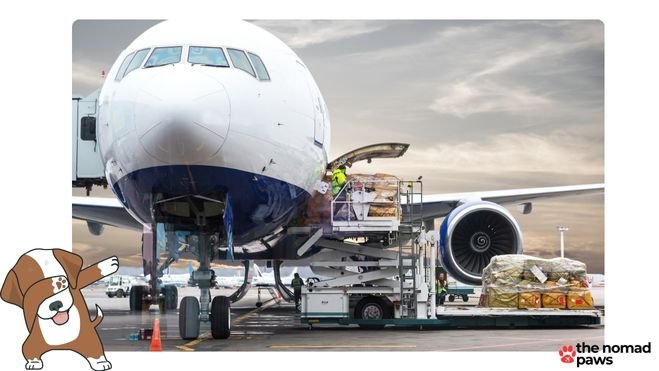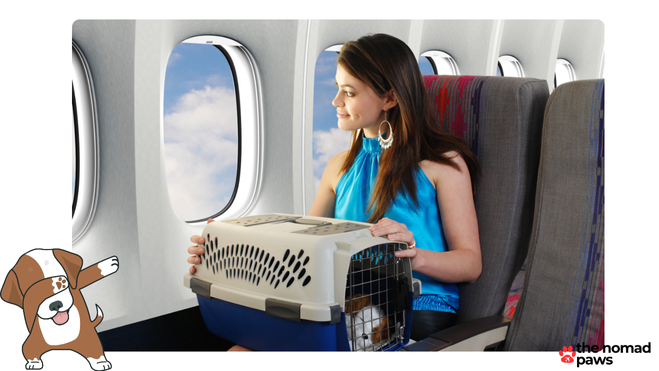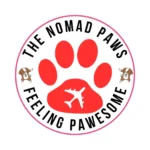If you’re planning a move to France with your beloved pet, you’re likely feeling a mix of excitement and apprehension.
Relocating animals across borders can be complex, with various regulations and logistics to navigate. That’s where pet relocation services come in.
They offer expert guidance and support to guarantee your furry friend’s journey is as stress-free as possible.
From handling paperwork to arranging suitable transportation, these professionals take care of every detail. But what exactly does the process involve, and how can you be certain you’re choosing the right service for your pet’s needs?
Relocating your pet to France? Use our FREE service!
Fill out our form to start your journey—gain expert insights and connect with France’s leading pet relocation services within 24 hours.
Lock in the lowest rates with free professional guidance—only a message away!
Why Choose The Nomad Paws for Pet Relocation to France?
You’re about to commence on an exciting journey with your furry friend to France, and you’ll want the best support possible.
The Nomad Paws offers unmatched expertise in pet relocation, tailoring our services to your pet’s unique needs.
From start to finish, we’re by your side, ensuring a smooth changeover for you and your beloved companion.
Our Expertise and Experience
At The Nomad Paws, our pet-travel expertise sets us apart.
We’ve been in the game for over a decade, honing our skills in international pet transportation.
Our team knows the ins and outs of pet travel regulations like the back of our hands. We’re not just experienced professionals; we’re pet lovers who understand what your furry friend means to you.
When it comes to transporting pets, we’ve seen it all.
From cuddly cats to energetic dogs, we’ve helped countless pet owners reunite with their four-legged family members across the globe.
Our pet transport services are tailored to your unique needs, whether you’re moving next door or to the other side of the world.
We’ve built a network of trusted partners worldwide, ensuring smooth changes no matter where you’re headed.
Got a question about airline policies? We’ve got answers.
Worried about destination-specific requirements? We’ll guide you through them step by step.
Our team thrives on solving problems and handling unexpected hiccups. Trust us, we’ve dealt with everything from last-minute flight changes to picky eaters mid-journey.
With The Nomad Paws, you’re not just getting a service; you’re gaining a team of pet-relocation wizards.
Personalized Service for Every Pet
Every pet is unique, and at The Nomad Paws, we tailor our services to match.
We understand that your furry friend isn’t just cargo – they’re family.
That’s why we take the time to understand your pet’s specific needs, considering factors like breed, age, and health status when planning their big move.
Our personalized service approach means we’re not just offering a one-size-fits-all solution. Instead, we craft custom travel solutions that put your pet’s comfort and safety first.
Whether your pup needs a cozy in-cabin spot or your Great Dane requires a specially designed dog travel crate, we’ve got you taken care of.
We don’t just handle transportation – we manage every aspect of your pet’s relocation.
From paperwork to paw-dicures, we’ve thought of it all. Our team keeps a watchful eye on your pet’s health status throughout the journey, ensuring they arrive happy and stress-free.
In fact, we are even able to help you with your pup’s diets – offering thorough advice from the best dog food for French Bulldogs to how much should a Maltipoo dog eat.
Choosing The Nomad Paws means choosing peace of mind. We treat every pet like our own, going the extra mile to make their travel experience purr-fect.
With us, your pet’s relocation isn’t just a service – it’s a tailored adventure designed just for them.
Comprehensive Support from Start to Finish
From the moment you contact us to the day your pet settles into their new French home, The Nomad Paws provides thorough support every step of the way.
We recognize that pet relocation isn’t just about moving your furry friend from point A to B; it’s an emotional journey for both you and your pet.
That’s why we offer extensive support that goes beyond basic transportation services.
Our partners will handle all the nitty-gritty details, from paperwork to veterinary coordination, guaranteeing a smooth relocation process.
Their teams are available 24/7 during transit, giving you peace of mind while your beloved pet is on the move.
But our care doesn’t stop when your pet lands in France. We comprehend the importance of post-arrival support, helping your four-legged family member adjust to their new surroundings.
Moving to France with your pet? Don’t worry! We have your needs addressed from tail to nose
Our global network of partners facilitates your pet’s journey as comfortably as possible. We’ll be there to address any concerns, answer your questions, and provide the emotional support you need during this exciting yet challenging time.
With The Nomad Paws, your pet’s French adventure starts on the right paw!
France Pet Import Requirements

First, you need a valid health certificate issued by a veterinarian within 5 days of travel, confirming that your pet is healthy and fit for travel.
As we explain in our guide to the countries that allow pit bulls, certain breeds – such as Pit Bulls and Rottweilers- are classified as dangerous and face strict regulations. If your dog is one of these dangerous breeds, you may need special permissions or documentation for import into France.
Compliance with EU pet travel regulations is essential, including documentation of tapeworm treatment for specific dogs prior to entry. This confirms your pet’s safety and avoids any complications upon arrival.
Vaccinations and Health Certificates

Your pet must have a valid rabies vaccination, administered at least 21 days before you arrive in France. This vaccination must be less than 12 months old.
Remember, your pet needs to be microchipped before the vaccination is given. This microchip guarantees your pet is correctly identified throughout their journey.
A health certificate, issued by a licensed vet within the last 10 days, is also a must.
This certificate confirms your pet is free from contagious diseases and fit for travel.
Depending on your pet’s country of origin, you may need an import permit, especially if you’re coming from a non-EU country.
Your pet must be at least three months old to travel to France, following EU regulations. For pet transport, a valid health certificate and vaccination records are essential.
Pet relocation services can help with these requirements, making sure your pet’s safe passage. So, stay organized, and you’ll be ready for your pet’s new adventure in France.
Microchipping and Breed Restrictions

If you’re planning to relocate your pet to France, you’ll need to make certain your pet meets all the necessary requirements to guarantee a smooth and trouble-free journey.
Microchipping is mandatory for all pets entering France, and it must comply with ISO 11784/11785 standards for identification.
Make sure your pet is microchipped before receiving their rabies vaccinations, as the microchip number must appear on all documentation.
Rabies vaccinations are essential, and pets must be at least 12 weeks old to receive them.
Our Pet Relocation Process
We’ve designed our pet relocation process with your furry friend’s comfort and safety in mind.
Our journey together starts with a personalized consultation to understand your pet’s unique needs and create a tailored plan.
From there, we’ll guide you through every step, from paperwork and vet visits to travel arrangements and arrival support, ensuring a smooth changeover for your beloved companion.
1. Initial Consultation and Planning
At the heart of our pet relocation process lies the essential initial consultation and planning phase.
We kick things off by sitting down with you to fully understand your furry friend’s unique needs and travel requirements.
This isn’t just a quick chat – it’s a thorough exploration into your pet’s world, helping us craft a relocation plan that’s as unique as they are.
During this planning phase, we’ll guide you through the maze of health certificates and vaccinations needed for your pet’s journey.
Don’t worry – we’re experts at maneuvering through local regulations, ensuring your pet’s paperwork is spot-on.
We’ll also cook up customized transport solutions based on your pet’s size, breed, and any special needs they might have. Got an older pup or a cat with health issues? We’re here for you.
We know how nerve-wracking moving can be, so we’ll keep you in the loop with real-time updates throughout the entire process.
Our goal? A seamless relocation that’ll have both you and your pet wagging your tails with joy. Let’s make this adventure a walk in the park!
2. Find the Best Pet Relocation Service in France
After our initial consultation, our dedicated team will leverage our extensive European network of partners to connect you with the top pet relocation services available in France.
We understand that relocating your pet can be a daunting process, which is why we focus on pairing you with professionals who are not only experienced but also reputable and trustworthy.
Through our exclusive agreements, we have the ability to secure the best possible prices, ensuring that you receive exceptional value without compromising on quality.
Our partners are well-versed in the intricacies of pet relocation within the European Union and from other countries, providing you with peace of mind as they handle every detail of your pet’s journey to France.
Our selected partners are familiar with French regulations and requirements for pet entry, including microchipping, rabies vaccinations, and EU pet passports.
They can assist with all necessary documentation and ensure compliance with French customs and veterinary regulations.
Whether you’re moving to Paris, Lyon, Marseille, or any other part of France, our network of pet relocation experts can provide door-to-door service, temporary boarding if needed, and guidance on local pet registration requirements once you arrive.
3. Documentation and Veterinary Support
The mountain of paperwork required for pet relocation can be intimidating, but we’ve got it covered.
Our partners are there to handle all the documentation and veterinary support you’ll need for your furry friend’s big move.
The process starts with getting a health certificate from a vet, which we’ll help you obtain 7-10 days before travel. Don’t worry, we’ll remind you!
We’ll make sure your pet is microchipped and has all the necessary vaccinations. It’s like giving them a tiny passport and travel shots!
Since fleas are very bad this year, we’ll even treat them for fleas and ticks with top products like Nexgard Plus or Simparica Trio before the journey with, so they’ll be comfy and itch-free.
Here’s where it gets a bit tricky: the USDA needs to endorse those vet certificates. But don’t sweat it!
Our partners will handle all that bureaucratic stuff for you. Our team double-checks every piece of paper to make sure it’s perfect. We’re like pet paperwork detectives!
4. Travel Arrangements and Logistics
Now that we’ve got all the paperwork sorted, let’s talk about getting your pet from point A to point B. Our pet transportation services are designed to make your pet’s move as smooth as possible. We’ll handle all the travel arrangements, so you can relax knowing your furry friend is in good hands.
Our experienced professionals take care of every detail, from choosing the right airline-approved kennel to ensuring your pet’s comfort during the journey. We’ll even help with any last-minute veterinary needs, like flea treatments, to make sure your pet is ready for takeoff.
But we don’t just stop at the airport. Our door-to-door transport options mean we’ll pick up your pet and deliver them safely to their new home. Throughout the journey, we’ll keep you updated with real-time tracking, so you’ll always know where your pet is.
We know moving can be stressful, especially when it involves a beloved pet. That’s why we’ve designed our process to give you peace of mind. From start to finish, we’re here to make your pet’s relocation a tail-wagging success!
5. Arrival Assistance and Follow-up
Once your pet touches down in their new location, our dedicated team springs into action. We’re right there to provide extensive arrival assistance, guaranteeing a smooth changeover for your furry friend.
Our experienced handlers perform thorough health assessments, checking for any signs of stress or discomfort from the journey.
We don’t just drop off your pet and disappear. Our follow-up support is designed to help your four-legged family member settle in comfortably.
We’ll give you personalized care recommendations tailored to your pet’s unique needs. Whether it’s advice on adapting to a new climate or tips for reducing stress in unfamiliar surroundings with dog pheromones, we’ve got your back.
We’ll stay in touch with you after the move, offering guidance as your pet adjusts to their new home. Our team is always ready to answer questions or address concerns you might have.
We understand how important your pet’s well-being is, so we’ll work tirelessly to guarantee they’re happy and healthy in their new environment.
Your peace of mind is our top priority, and we’re here to make this big change as easy as possible for both you and your pet.
Pet Transport Options for France
When relocating your pet to France, you have several transport options to choose from.
You can consider airlines that allow big dogs in-cabin or cargo services, or you might prefer ground transportation to guarantee your pet’s comfort.
Our France pet relocation partners provide a range of services, including shared and private transport, to fit your specific needs and keep your pet safe.
Airlines and Routes

Relocating your pet to France involves traversing a variety of airline options and routes, each with its own set of guidelines and requirements.
When selecting a pet transport option, you have several airlines like Air France, Lufthansa, AirBaltic, and KLM to choose from.
These airlines provide specific guidelines for traveling with pets, guaranteeing a smooth and safe journey.
For instance, most airlines require pets to be transported in IATA-approved kennels like the Petmate Sky Kennel pet carrier, and advance booking is recommended to secure availability and compliance with regulations.
Health certificates and vaccination records, particularly for rabies, are mandatory and should be obtained from a veterinarian within 7-10 days of travel.
Direct flights to major French cities like Paris and Nice are available, reducing transit time and stress for pets during travel.
It’s crucial to check individual airline policies regarding pet travel as they may vary concerning size, weight, and fees associated with transporting animals. By understanding these details, you can better prepare for your pet’s travel needs.
In-Cabin vs. Cargo Considerations

After selecting your preferred airline and route, you’ll need to decide between in-cabin and cargo transport for your pet’s journey to France.
In-cabin pet transport is perfect for smaller furry friends, typically under 15-20 lbs. You’ll keep your pet close in pet carrier like the 2Pet foldable dog crate, easing both your nerves during the flight.
For larger pets or when in-cabin isn’t an option, cargo transport is the way to go. Don’t worry – airline-approved crates guarantee your pet’s safety and comfort.
But heads up! Some airlines have breed restrictions, especially for those adorable squishy-faced pups. For example, French Bulldogs might not be allowed in cargo and Pugs may not be allowed to fly on planes due to health risks.
Whatever option you choose, you’ll need to gather some paperwork. Health certificates and vaccination records are must-haves to comply with France’s travel regulations.
Ground Transportation Services

You’ll be relieved to know that there are various ground transportation services tailored to your furry friend’s needs.
Whether you prefer a shared ride, private transport, or even air-conditioned vans, there’s a solution for every pet and budget.
Your pet’s comfort is the top priority during this journey. Dedicated handlers, experienced in pet care, will be there every step of the way to minimize stress and keep your furry friend happy.
Plus, you’ll never be in the dark about your pet’s whereabouts, thanks to real-time tracking updates.
Preparing Your Pet for Relocation

Preparing your pet for relocation can be a challenging task, but don’t worry—it’s not as difficult as it seems!
You’ll need to start with health check-ups and vaccinations to guarantee your furry friend is fit for travel.
Next, focus on crate training and familiarization to make your pet comfortable during the journey.
Finally, we’ll share some handy tips to make the whole experience as smooth as possible for both you and your beloved companion.
Health Check-ups and Vaccinations
Ensuring your pet’s health and vaccination status is up-to-date forms an important step in the relocation process.
You’ll need to obtain health certificates for your furry friend, which are valid for 7-10 days before departure.
These documents prove your pet is fit for travel and free from contagious diseases. Don’t forget about routine vaccinations, especially rabies for dogs and cats over 12 weeks old. Keep all vaccination records handy – you’ll need them!
A microchip is a must-have for pet identification. Think of it as your pet’s tiny, high-tech passport! It’s a lifesaver if your four-legged companion gets lost during the move.
Schedule a visit to your veterinarian well in advance of your travel date. They’ll help you navigate the health requirements for your destination.
Here’s a heads-up: some countries have breed and age restrictions. Double-check these rules to avoid any surprises at the border.
Remember, preparing your pet’s health documents is like packing their invisible suitcase – it’s vital for a smooth journey. With proper planning, you’ll have your furry friend ready to start your new adventure together!
Crate Training and Familiarization

With your pet’s health checks complete, it’s time to focus on their travel accommodations.
Crate training is essential for a stress-free relocation, so start early! Begin several weeks before the big move to help your furry friend associate their crate with safety and comfort.
Let your pet explore the crate with the door open, rewarding them with treats and praise. This creates positive associations, making the crate a happy place.
Choose a crate that’s just right – your pet should be able to stand, turn around, and lie down comfortably. This is vital for their well-being during transport.
Make the crate feel like home by adding your pet’s favorite blankets or toys. These familiar scents will help ease anxiety during the change.
Practice makes perfect, so take short trips with your pet in the crate. Gradually increase the duration to build their confidence.
Post-Arrival Support in France

After your pet arrives in France, you’ll need to help them adjust to their new home. You’ll find plenty of local pet care resources, from vets to groomers, to keep your furry friend happy and healthy.
Local Pet Care Resources
Once you arrive in France, registering your pets with local veterinary services is essential to guarantee compliance with French pet regulations.
When you’re settling into your new place, finding pet-friendly accommodations is a top priority. Websites that list rentals and hotels with specific pet policies will make your shift smoother.
It’s also important to familiarize yourself with local pet services, such as dog walkers and grooming salons, which can enhance your pet’s adjustment to the new environment.
Adjustment Tips for Your Pet

Settling into a new home in France can be challenging for your furry friend, but with the right approach, you’ll help them adjust smoothly. Give your pet time to acclimate to their new surroundings. It might take a few weeks, but don’t worry – they’ll soon feel at home.
Stick to a consistent routine for meals, walks, and playtime. This stability will comfort your pet during the adjustment.
Create a safe space in your new home filled with familiar items like their bed and toys. It’s their cozy retreat when they need a break. You can even use the Adaptil transport spray to make them feel more comfortable in their new home.
Slowly introduce your pet to different rooms and outdoor areas. This gradual approach helps them explore without feeling overwhelmed. Remember, patience is key!
Request a Quote – It’s FREE
Ready to get a quote for your pet’s relocation? You’ll want to use our easy contact form to start the process.
When you fill it out, be sure to include all the important details about your furry friend and your travel plans – this helps us give you the most accurate quote possible.
Don’t worry about hidden fees or confusing pricing structures. You’ll receive transparent pricing that lays out all costs clearly.
No surprises, just straightforward information to help you plan.





